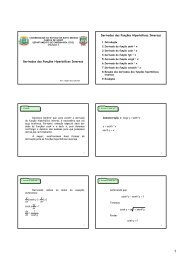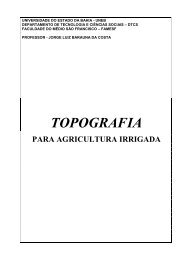Anuário Brasileiro do Arroz 2011 - Unemat
Anuário Brasileiro do Arroz 2011 - Unemat
Anuário Brasileiro do Arroz 2011 - Unemat
You also want an ePaper? Increase the reach of your titles
YUMPU automatically turns print PDFs into web optimized ePapers that Google loves.
The rice production chain in Brazil<br />
and major analysts of the sector believe<br />
that the price recovery process in<br />
Brazil is in the hands of the federal government.<br />
Efficient commercialization<br />
mechanisms would be the solution.<br />
“Without any artificial rise in prices,<br />
through federal government support<br />
measures, there is no change in sight<br />
within this scenario. In global terms,<br />
Help<br />
from<br />
above<br />
Recovery of the<br />
national rice<br />
prices depends<br />
on initiatives<br />
by the federal<br />
government, like<br />
commercialization<br />
mechanisms<br />
with high carryover stocks, things are<br />
not likely to change. In Brazil and<br />
in Mercosur there are huge carryover<br />
stocks”, explains Tiago Sarmento<br />
Barata, analyst with Agrotendências<br />
Consultoria em Agronegócios.<br />
The global scenario includes prices<br />
on the decline and stocks on the<br />
rise, highly valued Brazilian currency,<br />
record national crop and stable consumption,<br />
besides pressure coming<br />
from carryover stocks in Mercosur<br />
countries. The mechanisms launched<br />
by the Brazilian federal government<br />
up to April were not efficient because<br />
of too much bureaucracy involved,<br />
difficulties in contacting the producers,<br />
pressures from the bumper crop<br />
and, above all, from the exchange<br />
rate. “Market and structural factors<br />
prevented any effective reaction, but<br />
the PEP (Premium per Output Flow)<br />
should get more effective over the<br />
year, pushing <strong>do</strong>mestic prices to equal<br />
terms with import prices, now above<br />
the <strong>do</strong>mestic quotes”, says Élcio<br />
Bento, analyst with Safras & Merca<strong>do</strong>.<br />
In the meantime, sectorial entities<br />
are after new actions by the federal<br />
government, in Brasília, to guarantee<br />
the minimum price of R$ 25.80 per<br />
50-kg sack of rice in the husk, profits<br />
for the growers and the prevention of<br />
losses. The entities are also demanding<br />
structural measures intended to<br />
improve the competitive edge, besides<br />
investments in infrastructure and logistics<br />
and an import compensating<br />
policy, says the president of the Rio<br />
Grande <strong>do</strong> Sul Federation of Rice<br />
Growers’ Associations (Federarroz),<br />
Renato Rocha.<br />
These moves, nonetheless, are expected<br />
to go into force as of the coming<br />
crop. At the moment, priorities<br />
include emergency mechanisms, like<br />
auctions focused on public and private<br />
option contracts, the establishment<br />
of a target price, loan renegotiation,<br />
and end to imports and speedier crop<br />
shipment, with support to exports and<br />
humanitarian <strong>do</strong>nations.<br />
Solace within this sense came in<br />
late April, with the decision of the<br />
National Monetary Council (NMC)<br />
to reopen the Stimulus Program for<br />
Sustainable Livestock Production<br />
(Produsa). The deadline was extended<br />
until 30th September. The program<br />
consists in a special credit line to serve<br />
farmers affected by the climatic consequences<br />
from 1st November 2009<br />
to 31st March 2010. Furthermore, the<br />
NMC postponed by up to 100% the<br />
negative balance of the Federal Rice<br />
Loan Operations of the 2009/10 crop.<br />
The main beneficiaries of the measure<br />
are the growers in Rio Grande <strong>do</strong> Sul<br />
and Santa Catarina.<br />
Among the mechanisms which had<br />
been made available was the Federal<br />
Government Acquisition (AGF) program,<br />
which offered R$ 202 million in<br />
contracts from February to April <strong>2011</strong>.<br />
However, because of a shortage of credentialed<br />
warehouses, excessive bureaucracy<br />
in accessing the mechanism<br />
and lack of producer guarantees, only<br />
some 10 thousand tons were acquired<br />
through the system. The auctions<br />
staged by the PEP offered contracts<br />
amounting to 1.022 million tons to<br />
the states of Rio Grande <strong>do</strong> Sul, Santa<br />
Catarina, Paraná and Mato Grosso <strong>do</strong><br />
Sul, with 704.4 thousand tons effectively<br />
negotiated. In values, it was R$<br />
72.3 million.<br />
The lack of profits is particularly serious<br />
in Rio Grande <strong>do</strong> Sul and Santa<br />
Catarina. The two states account for<br />
73% of the national production. It is<br />
estimated that upwards of 23 thousand<br />
producers incurred losses and<br />
more than 80% of them have no access<br />
to public mechanisms for lack<br />
of credit or collateral, or because of<br />
ignorance regarding the process. “We<br />
are at the mercy of the government”,<br />
Rocha confesses.<br />
35


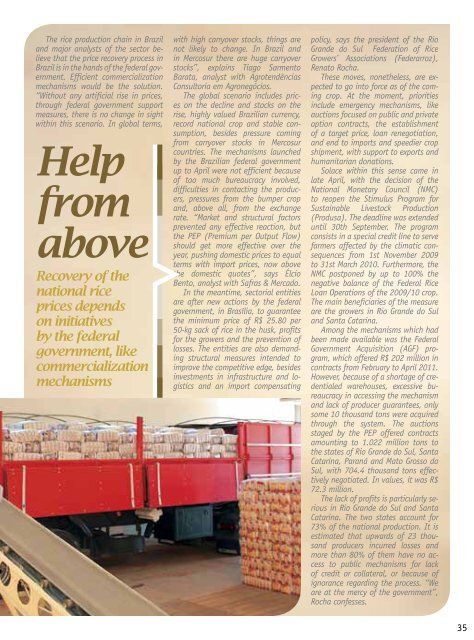
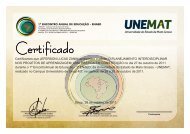
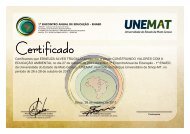
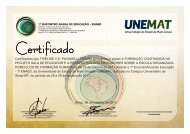
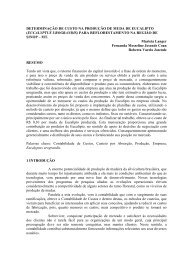
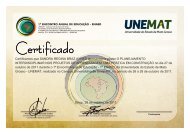
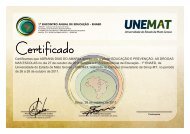
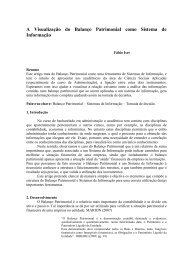
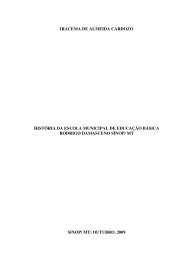
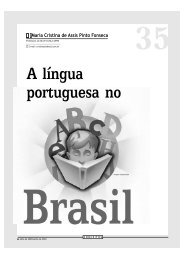
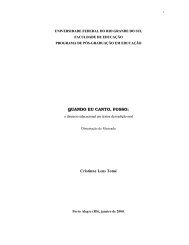
![Aula 31 - Funções Hiperbólicas [Modo de Compatibilidade] - Unemat](https://img.yumpu.com/14334654/1/184x260/aula-31-funcoes-hiperbolicas-modo-de-compatibilidade-unemat.jpg?quality=85)
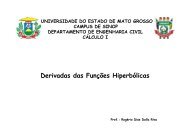
![Aula 31 - Funções Hiperbólicas [Modo de Compatibilidade] - Unemat](https://img.yumpu.com/14332146/1/190x135/aula-31-funcoes-hiperbolicas-modo-de-compatibilidade-unemat.jpg?quality=85)
